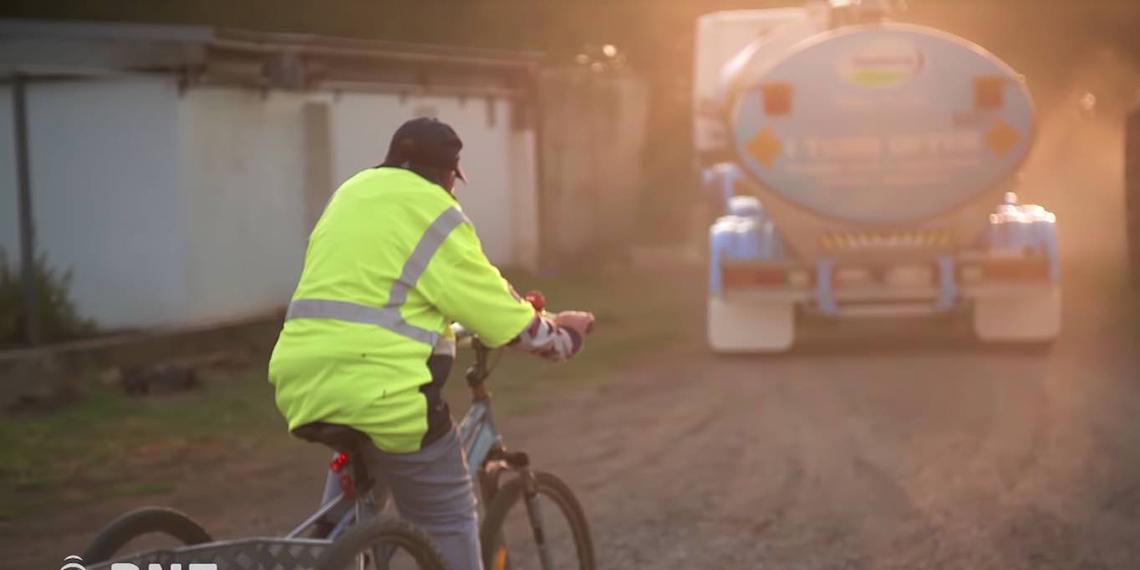A sacred life

Salvationist Andrew Oliver became an internet sensation when Radio New Zealand shared the story of his special relationship with Fonterra tanker drivers. The story quickly went viral, and the Oliver family are now speaking out about the importance of valuing people with disabilities.
The licence plate on Andrew Oliver’s specially-made trike says, ‘ANDREW—Fonterra No 1 Fan’. And for good reason.
Having grown up on a dairy farm, Andy is naturally mad on trucks and tankers. He has Fryns-Aftimos syndrome, a genetic condition so rare he is the only person in New Zealand ever diagnosed with it. At 35 years old, he has the intellectual age of a six-year-old and five different types of epilepsy.
For the past 15 years, Andy’s nightly ritual has included drawing a picture for the tanker driver and waiting for the familiar honk, before going out to greet the truck. But sometimes the tanker wouldn’t arrive until the early hours of the morning.
‘If the tanker hadn’t come, he wouldn’t go to bed,’ Andy’s father Ken Oliver told RNZ’s Indira Stewart. ‘I phoned the [Fonterra] call centre and I actually started crying on the phone I was just so shot, and I said “Look, my life has become impossible”, and explained what was going on … The person at the call centre said, “Well, I think we can help”.’
As a result, the diary giant Fonterra changed their entire collection schedule to ensure they got to Andy before 8pm every night.
The team at the local Fonterra plant even held a sausage sizzle to raise money for a new trike for Andy. Now, every night when Andy hears the honk of the tanker, he jumps on his trike—complete with Fonterra hat and vest—to give the driver his picture, talk trucks and catch up.
The story, which featured on RNZ, has captured hearts around the world, with over 20,000 views and counting.
God’s creation
Both Ken and Deirdre are life-long Salvationists—Ken is treasurer of Hamilton City Corps and has played in the brass band for 50 or so years.
Andy’s new-found fame has given the family an important platform to talk about the sanctity of life—for all people. It’s a belief they have fought hard for, since before Andy was born.
‘We had an 18-week scan when Deirdre was pregnant with Andy, and we found out he had some deformities,’ explains Ken. ‘We were told to get a termination, but we said that life is sacred, so “no”.
‘I came to the conclusion that sin has caused us all to be born as a broken version of that which God intended—so broken that the difference between Usain Bolt and someone in a wheelchair is not that great. Despite our fallen state we are still the crowning glory of God’s creation.’
Ken, who has a PhD in Chemistry, believes every life is a miracle. ‘We all begin life as a single human cell and that single human cell contains all the human information that determines the final product. That’s a miracle. How dare we say that anyone at any stage of life is not human and therefore expendable.
‘I don’t consider my son to be significantly more disabled than I am. Compared to God’s standard of perfection, we are all disabled, and it just shows more with some people. That’s the whole essence of atonement—that we are all disabled and that the whole of creation will be restored.’
A new life
Funding and support for people with high needs is woefully inadequate in New Zealand, often driving their carers (usually parents) to breaking point. ‘Between us, Deirdre and I have been caring for Andy for 168 hours a week—which is the equivalent of four unpaid jobs,’ reflects Ken.
Andy’s condition is so rare that funding systems don’t recognise it, so when it came to getting support ‘there just wasn’t any’. At times, it bordered on the ridiculous: ‘I rang ACC when [Andy] broke a bone in his foot and I got told by the agent “Well, I can’t talk to you, I can only talk to him”, and I was like, “Well, here, talk to him, he’ll tell you all about fire engines. He won’t tell you anything about his broken foot”,’ Deirdre told RNZ.
But a trial initiative called Enabling Good Lives is now giving Andy greater independence than they could have ever dreamed of. The programme is a new way of providing support for people with disabilities, which allows them to choose how funding is used, to meet their individual needs.
‘Our motivation with Andy is that we realised we are getting older. We have been his 24/7 carers, and as we get older we want to know that he will be cared for,’ reflects Ken.
Through this initiative, Andy is now living in his own home right on the Oliver farm, with the help of carers he has chosen himself. ‘He tells the carers what meals he wants and he helps to prepare them if he’s in that sort of mood. He gets out and about, he goes to the library,’ says Deirdre. ‘I never wanted him to go into residential care. I like the idea that he can help to choose his carers.’
Andy’s new independence is a source of comfort for Ken and Deirdre, alongside their deep faith: Deirdre recalls the precious moment when Andrew, still a child, accepted Jesus as his Saviour.
‘I sense that Andrew does understand about God and I believe that God will act justly towards him. I have great confidence in that and take comfort from it,’ says Ken.
Original story by Indira Stewart, Radio New Zealand. - Photos taken from video by Tim Collins.
By Ingrid Barratt (c) 'War Cry' magazine, 15 June 2019, p14-15. You can read 'War Cry' at your nearest Salvation Army church or centre, or subscribe through Salvationist Resources.
